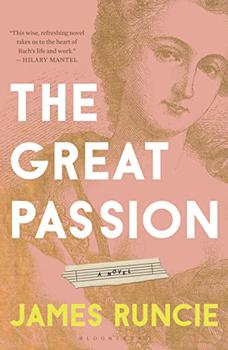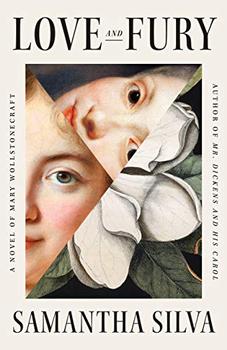Summary | Excerpt | Reviews | Beyond the book | Read-Alikes | Genres & Themes | Author Bio

From acclaimed bestselling author James Runcie, a meditation on grief and music, told through the story of Bach's writing of the St. Matthew Passion.
In 1727, Stefan Silbermann is a grief-stricken thirteen-year-old, struggling with the death of his mother and his removal to a school in distant Leipzig. Despite his father's insistence that he try not to think of his mother too much, Stefan is haunted by her absence, and, to make matters worse, he's bullied by his new classmates. But when the school's cantor, Johann Sebastian Bach, takes notice of his new pupil's beautiful singing voice and draws him from the choir to be a soloist, Stefan's life is permanently changed.
Over the course of the next several months, and under Bach's careful tutelage, Stefan's musical skill progresses, and he is allowed to work as a copyist for Bach's many musical works. But mainly, drawn into Bach's family life and away from the cruelty in the dorms and the lonely hours of his mourning, Stefan begins to feel at home. When another tragedy strikes, this time in the Bach family, Stefan bears witness to the depths of grief, the horrors of death, the solace of religion, and the beauty that can spring from even the most profound losses.
Joyous, revelatory, and deeply moving, The Great Passion is an imaginative tour de force that tells the story of what it was like to sing, play, and hear Bach's music for the very first time.
As someone whose primary occupation was to set biblical texts to music, Bach's life revolved around the Lutheran Church. But Runcie goes beyond historical necessity to embed quiet religious wisdom in certain passages, particularly those concerning grief. While some are specific to Christian theology, most of these sections are more generic, applicable to any faith. I found this aspect to be moving, and a major highlight of the narrative. The Great Passion is an exceptionally well-written historical novel...continued
Full Review
 (700 words)
(700 words)
(Reviewed by Kim Kovacs).
 The protagonist of James Runcie's novel, The Great Passion, is an organist and organ builder. The pipe organ has been referred to as the "king of musical instruments" due to its size, complexity and power. Though its structure is similar to that of a piano, it has not one keyboard but as many as seven, plus a pedalboard played with the feet, and sometimes hundreds of "stops" on the console that are manually pulled opened or pushed closed during a piece to add musical effects (e.g., producing a buzzy tone or one that sounds like a bell). A single organ can be comprised of thousands of pipes, and the organ has the largest and oldest repertoire of any instrument in Western music.
The protagonist of James Runcie's novel, The Great Passion, is an organist and organ builder. The pipe organ has been referred to as the "king of musical instruments" due to its size, complexity and power. Though its structure is similar to that of a piano, it has not one keyboard but as many as seven, plus a pedalboard played with the feet, and sometimes hundreds of "stops" on the console that are manually pulled opened or pushed closed during a piece to add musical effects (e.g., producing a buzzy tone or one that sounds like a bell). A single organ can be comprised of thousands of pipes, and the organ has the largest and oldest repertoire of any instrument in Western music.
It's believed that the earliest iteration of the organ was ...

If you liked The Great Passion, try these:

by Emily Howes
Published 2025
A "beautifully written" (Hilary Mantel) story of love, madness, sisterly devotion, and control, about the two beloved daughters of renowned 1700s English painter Thomas Gainsborough, who struggle to live up to the perfect image the world so admired in their portraits.

by Samantha Silva
Published 2022
From the acclaimed author of Mr. Dickens and His Carol, a richly-imagined reckoning with the life of another cherished literary legend: Mary Wollstonecraft – arguably the world's first feminist.